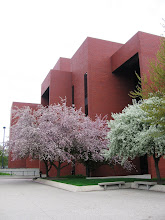Ball State University Libraries Joins MySpace
A topic of discussion among librarians is whether academic libraries should belong to online social communities, such as MySpace. This is an important question because MySpace is the most successful social networking site, receiving more daily visitors than Google.
MySpace is a free site that consists of the online profiles of young adults, rock bands, and other assorted entities. This virtual space allows its users to blog, join groups, send instant messages, promote events, share photos, and much more.
The majority of our 4,300 daily visitors are undergraduate students who are accustomed to using new technologies, like MySpace. They use MySpace and facilities such as those provided by the University Libraries, to meet friends, discover new information, and figure out “what’s cool.”
These students belong to the Millennial Generation. Technology has always been a part of their world. They expect to encounter it, and in most cases, use it for their benefit.
Creating a MySpace profile for the University Libraries provides the Libraries a unique opportunity to acknowledge that we understand our student’s information needs and are compatible with their technological and cultural expectations.
A profile on MySpace for the Ball State University Libraries is available at www.myspace.com/brackenlibrary.
This profile is designed to use the power of MySpace to raise awareness about the Libraries’ awesome services and resources. Students who visit the Libraries’ MySpace page will discover links to CardCat, Ask a Librarian, online academic databases, and much more. It may also function as a virtual suggestion box since students can post comments and send messages to the profile. Our off-campus remote users will still need to be authenticated through the EZproxy server.
Finally, and of greatest importance, the Libraries’ MySpace profile will let students know that the University Libraries is a cutting-edge institution that comfortably reaches beyond the traditional definitions of “library” to meet them in their space.


0 Comments:
Post a Comment
<< Home